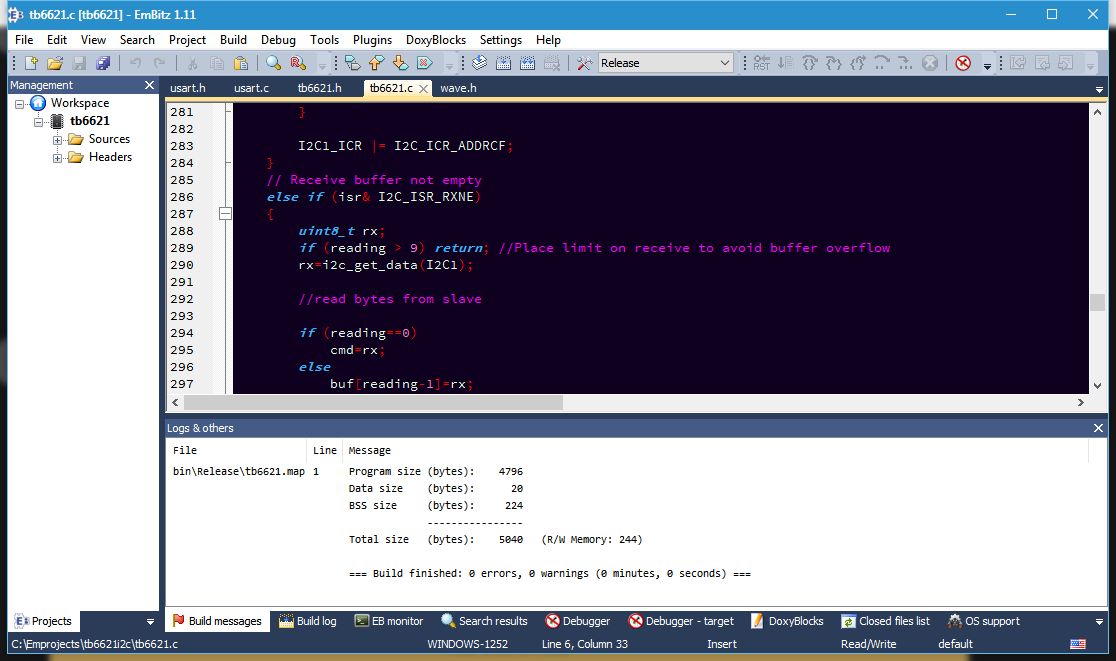I2C code based on interrupts , no polling code.
I2C Clock Speed 100Khz
Address 0x32 (editable at HEX file)
Commands
MOTOR_GET_COUNT 0x02: Send 0x02, Read int32 (4 bytes)
MOTOR_SET_COUNT 0x03: Send 0x03 int32 (5bytes)
MOTOR_SET_TARGET 0x04: Send 0x04+ int32 (total 5bytes)
MOTOR_GET_TARGET 0x05; Send 0x05, Read int32 (4 bytes)
MOTOR_SET_TICKS 0x06: Send 0x06+ int32 (total 5bytes)
MOTOR_SET_DIR_RES 0x07: Send 0x07+ int32 (total 5bytes)
MOTOR_SET_PRESCALER 0x08:Send 0x08+ int32 (total 5bytes)
MOTOR_SET_WAVE_SCALE 0x09:Send 0x09+ int32 (total 5bytes)
MOTOR_SET_SPEED:0x0A:Send 0x0A+float (total 5bytes)
MOTOR_SET_TARGET_SPEED 0x0B:Send 0x0B+float (total 5bytes)
MOTOR_GET_TARGET_SPEED 0x0C
MOTOR_GET_SPEED 0x0D
MOTOR_GET_DIR_RES 0x0e
Values for set speed microsteps/s signed 4 bytes float
SET_SPEED set speed with no acceleration SET_TARGET_SPEED accelerate from current set speed.
Speed timer frecuency 48khz tick 20,8us At this moment only min value -65535 to +65535 speed 65535-> 1,3s per microstep positive direction speed 30000->0,65s per microstep positive direction speed -15000->0,3125s per microstep negative direction
Resolution 1-> 32 msteps 2->16 4->8 8->4 counter is always 32 microsteps resolution
Arduino test code (works on AVR and esp8266)
#include <Wire.h>
#define SLAVE_ADDRESS_1 0x32
//Set Commands
#define MYSLAVE_SET_REG 0x01
//GET commands
#define MOTOR_GET_COUNT 0x02
#define MOTOR_SET_COUNT 0x03
#define MOTOR_SET_TARGET 0x04
#define MOTOR_GET_TARGET 0x05
#define MOTOR_SET_TICKS 0x06
#define MOTOR_SET_DIR_RES 0x7
#define MOTOR_SET_DIR_RES 0x07
#define MOTOR_SET_PRESCALER 0x08
#define MOTOR_SET_WAVE_SCALE 0x09
#define MOTOR_SET_SPEED 0x0A
#define MOTOR_SET_TARGET_SPEED 0x0B
#define MOTOR_GET_TARGET_SPEED 0x0C
#define MOTOR_GET_SPEED 0x0D
#define MOTOR_GET_DIR_RES 0x0e
#define PRINT_WAVE 0x44
void setup() {
Wire.begin(); // join i2c bus (address optional for master)
Serial.begin(9600); // start serial for output
}
int32_t read_wms( uint8_t command, int address)
{ int32_t pos;
char *pointer;
char c;
pointer=(char*)(&pos);
Wire.beginTransmission(address);
Wire.write(command);
Wire.endTransmission();
delay(5);
Wire.requestFrom(address, 4);
while (Wire.available()) {
char c = Wire.read();
(*pointer++)=c;
}
return pos;
}
void write_wms( uint8_t command, int address,int32_t value)
{
char *pointer;
pointer=(char*)(&value);
Wire.beginTransmission(address);
Wire.write( command);
Wire.write(pointer,4);
Wire.endTransmission();
}
void write_wmsf( uint8_t command, int address,float value)
{
char *pointer;
pointer=(char*)(&value);
Wire.beginTransmission(address);
Wire.write( command);
Wire.write(pointer,4);
Wire.endTransmission();
}
void loop() {
//goto from 0 to 1000
int32_t pos=0;//set motor counter to 0
int32_t target= 10000;//set desired position 10000
int32_t speed=300;//20,8 us * 300 =0.624s ->16,02 microsteps/s
float speedf=2000.0;//2000 msteps/s
write_wms(MOTOR_SET_COUNT,SLAVE_ADDRESS_1,pos);//send counter
write_wms(MOTOR_SET_TARGET,SLAVE_ADDRESS_1,target);//target set
// write_wms(MOTOR_SET_TICKS,SLAVE_ADDRESS_1,speed);//command speed
write_wmsf(MOTOR_SET_SPEED ,SLAVE_ADDRESS_1,speedf);//command speed
while ( (pos=read_wms( MOTOR_GET_COUNT ,SLAVE_ADDRESS_1))!=target)
{
delay (100);
Serial.println(pos);}
//motor will turn an stop until reach 1000 counter value
//now we command back 0 pos
target= 0;//set desired position 1000
speedf=-2000;//20,8 us * 300 =0.624s ->-16,02 microsteps/s
int32_t resolution=2; //motor will no run on 16 msteps
write_wms(MOTOR_SET_DIR_RES,SLAVE_ADDRESS_1,resolution);
write_wms(MOTOR_SET_TARGET,SLAVE_ADDRESS_1,target);//target set
// write_wms(MOTOR_SET_TICKS,SLAVE_ADDRESS_1,speed);//command speed
write_wmsf(MOTOR_SET_SPEED ,SLAVE_ADDRESS_1,speedf);//command speed
while ( (pos=read_wms( MOTOR_GET_COUNT ,SLAVE_ADDRESS_1))!=target)
{
delay (...
Read more »



Angelote ! Thank you for taking the time to make theses changes ! It works perfectly on esp8266 ! that's super nice ! I also tried on wemos D32, but it didn't want to compile because of : Wire.write(pointer,4); I tried putting off the length argument, and it looks that is close to work (It make fews steps forward/backward, but not working the same (probably because the speed is not well written I suppose) / I tried to use write_wms, instead of write_wmsf : same problem.
Last more little thing: Why did you choose to set the speed in positive and negative? because the difference between the position and the target should give the direction ? It should be easier to integrate the calculation of the sign's speed, inside the STM32, no? but that's a question. Thanks again for your work. Last year, I did a wrapper-library for your code, I'll probably update it and put it on github next week!